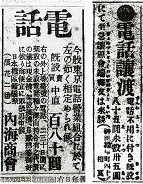
|
|
After the Sino-Japanese War, Japanese industry expanded enormously. New factories were built in cities, contact among people increased and transactions were handled more often. The demand for the telephone increased so much that the installation of telephone lines could not keep up with the demand, and at last advertisements for buying and selling telephones were placed in the railroad coaches between Shinbashi and Asakusa. The government tried to respond to the telephone boom by applying war reparations from China to the first telephone network extension, which was one of the national enterprises to promote. The number of telephone subscribers in Japan, some 2,800 in the 29th year of the Meiji Period, increased to 35,000 by the 37th year.
|